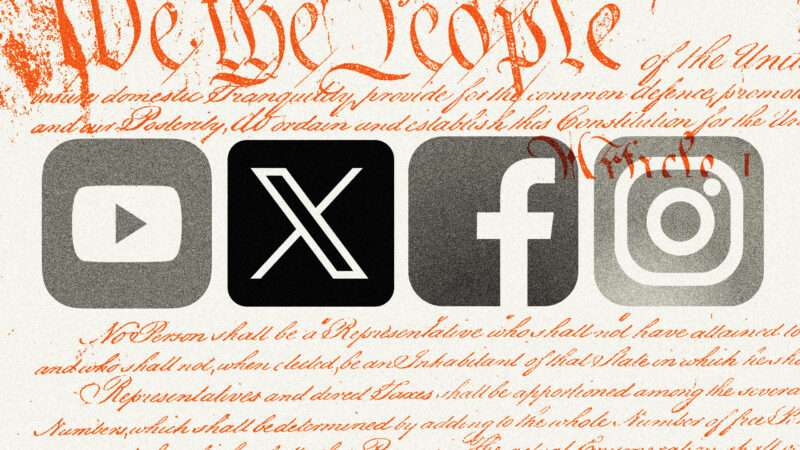Social Media Platforms Have Property Rights Too

While pundits and lawyers cross swords over free speech on social media, a quieter yet critically important principle is being ignored: property rights. In addition to violating the First Amendment, the rush to force social media platforms to host content violates the Fifth Amendment as well—in particular, the Takings Clause.
The Takings Clause says that government shall not take private property “for public use, without just compensation.” While many are familiar with the clause’s importance when the government wants to seize land through eminent domain, courts have also applied this right as a limit on the ability to overregulate property. For example, if a beach town requires the owners of oceanfront properties to let the public walk across their yards to get to the beach, this would require compensation, because the regulation effectively takes the property owner’s right to exclude, a cornerstone of ownership.
Likewise, the Takings Clause shields social media platforms from regulations requiring they host content or users they want to exclude. These platforms have as much right to eject unwelcome digital interlopers as homeowners do to stop the government from using their yard as a public right of way—unless they are given just compensation. If states intend to force social media apps to host users and content against their wishes, they will have to pay for it.
Both state and federal laws already treat online platforms as property. All states criminalize unauthorized access to computer systems, often expressly framing these crimes as trespass. Platforms defend their territory with encryption, authentication, firewalls, terms of service, and other digital fences. Laws affirming online platforms as protectable property, alongside the platforms’ own fortifications, clearly categorize them as “private property” under the Takings Clause.
Laws that mandate online platforms to accept certain content or users effectively invade private property. And the courts have established that when the government grants third parties access to private property without the owner’s consent, that requires compensation. The federal government had to pay a private marina owner in Hawaii before it could be compelled to allow public boating access. Similarly, the Supreme Court ruled just a few years ago that California had to compensate employers after it forced them to let union representatives access their property.
These precedents apply to content moderation laws like those currently challenged on First Amendment grounds. Texas’s law, which prohibits “censor[ing] a user, a user’s expression, or a user’s ability to receive the expression of another” based on viewpoint, does to digital spaces what unlawful regulations do to physical spaces—it negates the platform’s right to determine its occupants.
One might argue that digital exclusions aren’t as tangible as physical ones. Yet imagine a law that mandates private businesses to display campaign signs in their storefront windows. This law would not just violate the businesses’ speech rights; it would also clearly violate their property rights to control their own space.
Supporters of regulating social media might point to the Supreme Court’s decision in Pruneyard Shopping Center v. Robins, where the Court rejected a takings claim by a shopping mall forced to allow activists to distribute leaflets. The Court reasoned that a few activists wouldn’t significantly disrupt a mall’s essential purpose. The Court recently indicated that Pruneyard was an exceptional case because shopping malls are “generally open to the public” and lack the kind of terms of service that govern social media platforms.
Pruneyard was wrong to deny shopping malls the right to exclude, but, regardless of that decision, online platforms are not public malls. The core function of a shopping mall is to invite the public to shop. The essence of social media is speech and content. Interference with a platform’s ability to control content affects its core purpose. Even owners of traditional public spaces can exclude activities that contradict their business’s purpose. Social media platforms should be afforded similar rights under property law.
A win under the Takings Clause would mean that the government cannot require social media platforms to host all content unless they pay for the privilege. Compensation could be hard to calculate, given that the interference is ongoing and the economic effects are complex. Whatever the dollar amount, politicians will struggle to convince taxpayers to commit to a continuous cash funnel from their pockets to Big Tech. A win under the Takings Clause would likely make many regulators rethink their strategies.
As the early abolitionist Arthur Lee once said, property is the “guardian of every other right.” Property offers a personal dominion free from undue influence or control—spaces we can each shape to reflect our own values. In defending this for online platforms, we uphold the foundation of liberty and innovation.
The post Social Media Platforms Have Property Rights Too appeared first on Reason.com.
Source: https://reason.com/2024/04/16/social-media-platforms-have-property-rights-too/
Anyone can join.
Anyone can contribute.
Anyone can become informed about their world.
"United We Stand" Click Here To Create Your Personal Citizen Journalist Account Today, Be Sure To Invite Your Friends.
Please Help Support BeforeitsNews by trying our Natural Health Products below!
Order by Phone at 888-809-8385 or online at https://mitocopper.com M - F 9am to 5pm EST
Order by Phone at 866-388-7003 or online at https://www.herbanomic.com M - F 9am to 5pm EST
Order by Phone at 866-388-7003 or online at https://www.herbanomics.com M - F 9am to 5pm EST
Humic & Fulvic Trace Minerals Complex - Nature's most important supplement! Vivid Dreams again!
HNEX HydroNano EXtracellular Water - Improve immune system health and reduce inflammation.
Ultimate Clinical Potency Curcumin - Natural pain relief, reduce inflammation and so much more.
MitoCopper - Bioavailable Copper destroys pathogens and gives you more energy. (See Blood Video)
Oxy Powder - Natural Colon Cleanser! Cleans out toxic buildup with oxygen!
Nascent Iodine - Promotes detoxification, mental focus and thyroid health.
Smart Meter Cover - Reduces Smart Meter radiation by 96%! (See Video).





